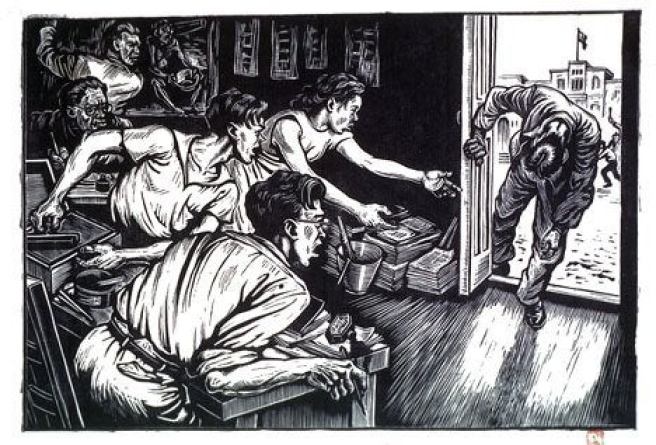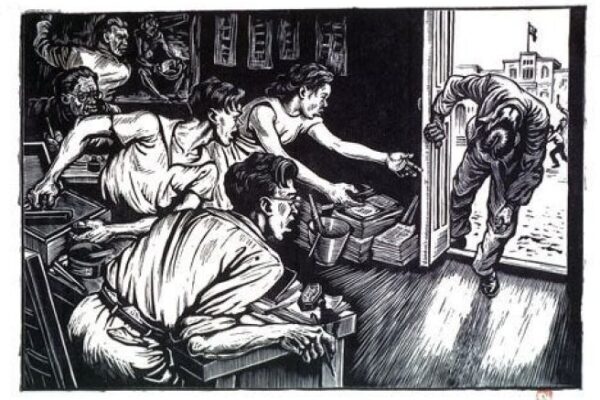It has been an exciting week in the recovery space. Most notably, with Jon Soske’s paper on what to keep, drop, and modify in the recovery world. Jon is a friend whom I met through Dr. Schwartz. I was in Providence at the Collaborative Perspectives on Addiction Conference (APA Division 50), filling in for my research partner who could not attend to present our work. Dr. Schwartz asked if he could connect me with a local guy; I agreed, and Jon and I met and had coffee the next day. Jon did not give me much background that first meeting, though we briefly recounted our stories regarding how we came into the recovery space. Jon was very open, inquisitive, and asked many questions about general theories, ideas, and my thoughts on recovery history. Little did I know that Jon would come to play a significant role in my intellectual life (outside of recovery science) and that his influence would shape and modify the very bedrock of my own theories and methods (within recovery science) in the years ahead.
Jon will never tell you (unless you ask), but I feel like I should highlight that Jon is an accomplished intellectual and scholar. Dr. Soske, to be more precise. His expertise involves such topics as decolonial struggles, African American history, and S. African apartheid. Dr. Soske has a Master’s in Comparative Literature and a Doctorate in History. He has authored articles, written and edited books on apartheid, the African National Congress (ANC), and has taught at one of the more prestigious universities. Jon was on sabbatical when I met him, and he was interested in getting involved in the recovery space. I say this not to highlight Jon’s credentials, though they are impressive, I highlight this fact because such personal histories are not uncommon. I’ve met lawyers, (real life) cowboys, accountants, millionaires, former mobsters, football legends, housewives, school teachers, songwriters, tennis trainers, real estate brokers, and even a professional Fooseball coach, all of whom now work in recovery spaces.
In Jon’s case, he brings his past experiences to bear on the recovery field, and in doing so, offers us an opportunity to refocus on our work as a social and political movement seeking emancipation through radical forms of acceptance, democracy, and agape love, that can overcome oppression, criminalization, and intersectionalities that layer and compound stigma, judgment, racism, and marginalization from society.
Fast forward a couple of years, and Jon is now a front-line advocate, organizer, and peer collaborator, doing daily street-level work while also pursuing scientific, historical, and cultural scholarship on recovery. Despite his humble demeanor and soft-spoken style, Jon is precisely the real deal radical intellectual that has come to define the recovery movement. He joins an army of them. Talk to any street-level harm reductionist whose years of hardcore street experiences have taught them how to theorize on power, the State, and systems of inequity. You will immediately note the incredible political insight and situational awareness. You will also note the thousand-yard stare of someone who works in close proximity to death and carnage that our mechanized systems and society constantly produce as a byproduct. Lived experience, street-level HR, and community-based work forges a unique intellectualism and political savvy that you cannot find in the purely clinical or academic space. Like many of us, Jon exists in multiplicity, hybridized, brilliant, shaped by the forces of genius, trauma, recovery ethos, inexhaustible hope, and deep empathy with the afflicted and oppressed.
I preface today’s post with this note on Jon quite simply because he represents an essential fact about the recovery movement and something that Tom Hill once taught me: We already have our “experts,” and we already have our history. Our movement overlaps with the histories and struggles of people from across the planet- from LGBTQ Liberation to AIDS activism, from the early 20th-century Progressive Movement, led by the early feminists of the Women’s Rights Movement, to today’s Carceral Abolitionists, the Civil Rights Movement, and the ongoing Indigenous and Decolonial struggles. To say nothing of the Disability Rights and Community Mental Health Movement. Jon is illustrative of a basic fact: we have a history that we are obliged to learn, and we have expertise that can be forged nowhere else but from within our experiences and that of the collective.

In short, from within our ranks and through these histories, we can find our truth, ethics, and a set of practices that no sympathetic politician can offer. We can envision a way forward that will not come from insider posts at the ONDCP, or SAMHSA. Instead, we can commit to a way of life defined by alleviating the suffering of others in ways that are impossible to accomplish through monolithic agencies- no matter how many people in recovery are elected to such positions. While we should never stop trying to work the levers of official power, we should not consider such power to be what defines us, nor what should guide us, nor can we wait for such power to recognize what we do.
Finally, no amount of scientific breakthrough can tell us more than what we already know. The best evidence in the world does nothing when the systems of power refuse to acknowledge it. Nor can objective science be helpful when it is stripped of the very ethos that defines our community, to be made into manuals and medicines to be bought and sold. To echo Jon’s words- recovery does not require a political patron, a moneyed philanthropist, a government champion, scientific legitimation, or sympathetic best-selling authors. We have our own experts, our own history, and therefore, we define our future.
Jon writes,
“My colleagues and collaborators understand the sacrifice and dedication of people working at every level of the crisis—from street outreach to departments of health. But none of us believe that any aspect of this macabre pantomime is necessary. We are dying from a callous alloy of racism, cynical indifference, Puritanism, lack of imagination and—most fundamentally—dishonesty. Any community less crippled by shame, fear and criminalization would have started the fires a long time ago.
At a basic level, the structure of this legal impasse distorts the contours of the crisis, obscuring what we are actually dealing with. Significant research identifies stigma as a major impediment—if not the single greatest obstacle—for people seeking help for problematic substance use. At every intersection (institutional, cultural, individual) stigma is interwoven with, works through and is reproduced by racism, neoliberal class and housing structures, for-profit medicine and the criminalization of substance use.
There is no way to model or design interventions to address stigma as it actually functions in this society without addressing the still accelerating “War on Drugs” and these other issues. Indeed, public officials and politicians often euphemistically talk about “stigma” to avoid directly acknowledging and addressing the public health consequences of prohibition. It is not that we should refuse to tackle discrete issues until we have the capacity to transform these systems (we urgently need to make whatever gains we can), but that the state-manufactured deadlock makes it impossible to clearly delineate their attributes and effects. Our social science is hamstrung by ad hoc pseudo-concepts and working fictions. We are wandering between mirages.”
We are a population that has suffered and continues to suffer under the lash of biopolitical, necropolitical, and psychopolitical forms of power that diffuse into society through capillaries of discipline, surveillance, and juridical institutions that constantly appropriate the language, ideas, interventions, and rationale of the recovery movement; thereby engulfing and subsuming these within the bosom of inherently flawed systems. In doing so, these systems strip the revolutionary potential of care, kinship, solidarity, collaboration, and compassion that are the basis of our life and work in this space. These systems then offer back to us a Justice-Like product, fresh for new markets and consumption. This systemic sleight of hand is the source of rage that you feel when a client dies alone in some dingy bathroom after months of progress under your care.
The systems that define, delimit, and frustrate our work are also the first systems to capitalize on the ingenuity and goodwill of our community. While at the same time, agents of these systems pay lip service in the language of social justice. Therefore, we must heed what Jon has taken the time to illuminate for us: these systems reproduce stigma, oppression, exclusion, and brutality. Even the most cautious and socially aware forms of engagement with the current system will always already further reproduce oppressive power, by legitimating, reifying,. and promoting a flawed system built upon marginalization, profit, and puritanical judgments. What we choose to do with that knowledge is up to us. The reproduction of institutional oppression is well studied and often written about by critical feminists, Indigenous scholars, Black liberation, and political revolutionaries.
Perhaps our intellectual, collaborative, and political futures lay elsewhere, other than trying to work within these systems which resist change at every turn? Well, our first duty then, is to be found in educating ourselves about history, about other struggles, and about the ways power is accumulated, exercised, and embedded within the social matrix of society. It is only then, that we may see a way forward that is not obscured, or confused by the forces that weigh in on us.
